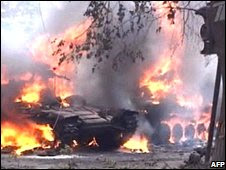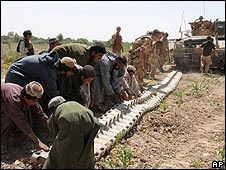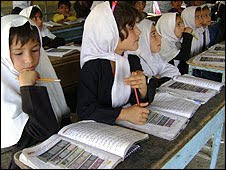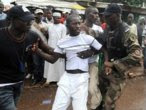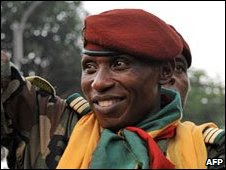 Tsunamis triggered by a strong quake in the South Pacific have killed at least 90 people across a number of islands.
Tsunamis triggered by a strong quake in the South Pacific have killed at least 90 people across a number of islands. At least 65 people were reported dead in Samoa, more than 20 in American Samoa and at least six in Tonga.
 Samoan officials say whole villages have been destroyed while thousands of people are reported to have been made homeless in American Samoa.
Samoan officials say whole villages have been destroyed while thousands of people are reported to have been made homeless in American Samoa. An 8.3-magnitude quake struck at 1748 GMT on Tuesday, generating 15ft (4.5m) waves in some areas of the islands.
The Samoa islands comprise two separate entities - the nation of Samoa and American Samoa, a US territory. The total population is about 250,000.
 A general tsunami warning was issued for the wider South Pacific region but was cancelled a few hours later.
A general tsunami warning was issued for the wider South Pacific region but was cancelled a few hours later. The general manager of Samoa's National Health Service told the BBC that 65 people had died and 145 people were injured.
US President Barack Obama has declared a major disaster in American Samoa, enabling federal funding to made available to help victims.
Samoan Prime Minister Tuilaepa Sailele Malielegaoi said he was shocked at the devastation.
 "So much has gone. So many people are gone," he told the AAP news agency.
"So much has gone. So many people are gone," he told the AAP news agency. False alarm
"Some of the areas are only a few feet above sea level, so you can imagine the devastation," said Eni Faleomavaega, who represents American Samoa in the US.
"It caused severe damage to property, there are cars floating everywhere."
 Mr Faleomavaega told the BBC the waves had "literally wiped out all the low-lying areas in the Samoan islands".
Mr Faleomavaega told the BBC the waves had "literally wiped out all the low-lying areas in the Samoan islands". He said the tsunami had hit within minutes of the quake, leaving people with no time to escape.
"There would have been no warning system capable of giving adequate warning to the people," he said.
Samoa's Deputy PM Misa Telefoni told Australia's AAP news agency that "the ocean went out within five minutes".
 Tsunamis triggered by a strong quake in the South Pacific have killed at least 90 people across a number of islands.
Tsunamis triggered by a strong quake in the South Pacific have killed at least 90 people across a number of islands. At least 65 people were reported dead in Samoa, more than 20 in American Samoa and at least six in Tonga.
Samoan officials say whole villages have been destroyed while thousands of people are reported to have been made homeless in American Samoa.
An 8.3-magnitude quake struck at 1748 GMT on Tuesday, generating 15ft (4.5m) waves in some areas of the islands.
The Samoa islands comprise two separate entities - the nation of Samoa and American Samoa, a US territory. The total population is about 250,000.
"With the location and the intensity... I don't know if anything better could have been done."
Officials at the Samoa Meteorology Division said many of those who died were killed by a second wave after they went to gather fish that had been washed up after the first.
Sirens reportedly blared out across the Samoan capital, Apia, again late on Tuesday but the warning was thought to be a false alarm.
Dr Lemalu Fiu, at a hospital in Apia, said the number of casualties was expected to rise as people arrived from coastal areas.
Mr Telefoni said there were fears the major tourism areas on the west side of Upolu island had been badly hit.
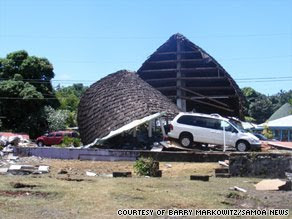 "We've had a pretty grim picture painted of all that coast," he said.
"We've had a pretty grim picture painted of all that coast," he said. Australia said one of its citizens was feared dead with six missing. Both Australia and New Zealand are preparing to send emergency aid.
Samoan officials say it could take a week before the full extent of the damage is known.
A government official in Tonga said at least six people had been killed and four more were missing.
(CNN News ) Deadly quake, tsunami strike Samoan islands --
A magnitude 8.0 earthquake struck the Pacific near American Samoa, triggering towering tsunami waves that gushed over the island and leaving at least 77 people dead.
American Samoa Gov. Togiola Tulafono, speaking from Hawaii, said Tuesday's quake ranked "right up there with some of the worst" disasters on the island. He said about 50 people had been treated for injuries so far but he expected that number to rise.
 The quake hit the small cluster of South Pacific islands early Tuesday morning.
The quake hit the small cluster of South Pacific islands early Tuesday morning. A series of aftershocks reverberated through the islands Tuesday and residents braced for more of nature's wrath. Entire villages lay flattened or submerged. The walls of water were so strong that they twisted concrete beams and mangled cars. Roads, buildings and private homes were heavily damaged.
By Tuesday evening, Laumoli, standing outside the LBJ Tropical Medican Center morgue in the capital of Pago Pago, confirmed 22 deaths.
"I thought it was the end of the world," said Dr. Salamo Laumoli, director of health services. "I have never felt an earthquake like that before."
In neighboring Samoa, the death toll climbed to 55, said Maulolo Tavita, a government minister. There, the fear was that the fatalities would continue to rise.
Laumoli also feared more fatalities would turn up in American Samoa as rescue workers were still trying to access parts of the island severed by damaged infrastructure.
 Laumoli said people in outlying villages on one end of the main island have been cut off because the main bridge was washed away.
Laumoli said people in outlying villages on one end of the main island have been cut off because the main bridge was washed away."Two or three villages have been badly damaged," he told CNN International.
Tulafono cited extensive damage to roads, buildings and homes, and said he had spoken to the military about mobilizing reserve forces for assistance.
The Pacific Tsunami Warning Center in Ewa Beach, Hawaii, canceled tsunami watches and warnings for American Samoa about four hours after the earthquake hit. However, a tsunami advisory is still in effect for for the coastal areas of California and Oregon. The Japan Meteorological Agency also activated a tsunami advisory along its eastern coast. The precautionary alert means that the height of a possible tsunami wave would be less than a foot and a half.
The Japan Meteorological Agency also activated a tsunami advisory along its eastern coast. The precautionary alert means that the height of a possible tsunami wave would be less than a foot and a half.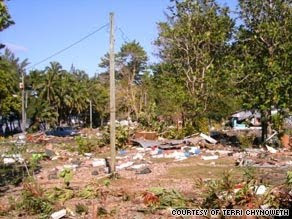 President Barack Obama "declared a major disaster exists in the Territory of American Samoa" late Tuesday and ordered federal aid to supplement local efforts. The declaration makes federal funding available to affected individuals.
President Barack Obama "declared a major disaster exists in the Territory of American Samoa" late Tuesday and ordered federal aid to supplement local efforts. The declaration makes federal funding available to affected individuals.The tsunami waves hit right in the middle of the Pago Pago harbor, the capital, said Cinta Brown, an American Samoa homeland security official working at the island's emergency operations center. The water devastated the village of Leone.


